Link: https://pan.baidu.com/s/1HR3Q-cojnCidRy1xrdlOxg
Extraction code: 7m56
--Sharing from Baidu online disk super member V3
Deploy other microservices
The registry eureka service configuration specifies the production server address
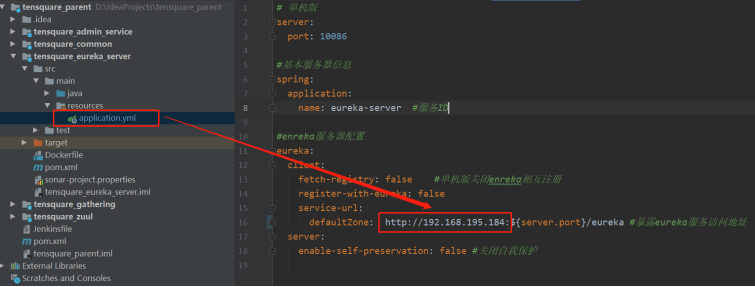
The service gateway configuration specifies the production server address
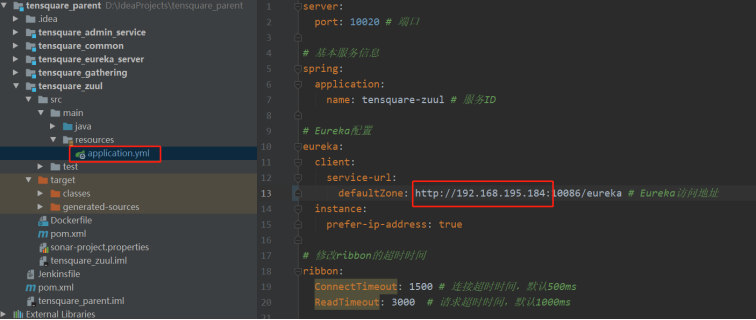
For the configuration of the certification center, the database uses the database in Jenkins
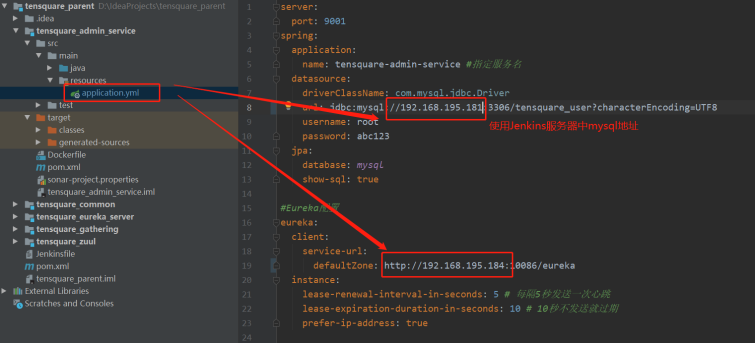
Active microservice configuration
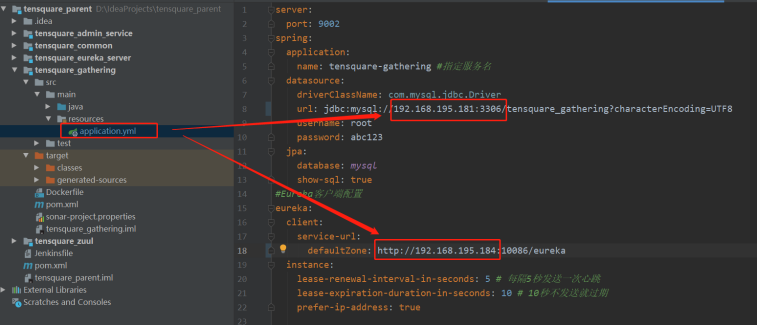
Submit after modification

Import database script into MySQL in Jenkins server
Click to view the codemysql> create database tensquare_user; mysql> use tensquare_user; mysql> source /opt/tensquare_user.sql; mysql> create database tensquare_gathering; mysql> use tensquare_gathering; mysql> source /opt/tensquare_gathering.sql; ------------------------Authorize remote login------------------------------------- grant all privileges on *.* to 'root'@'%' identified by 'abc123' with grant option; mysql> flush privileges;
After preparation, all microservices can be deployed directly


List of containers in production server
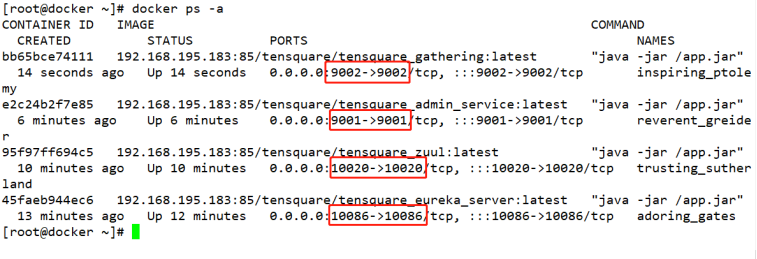

Test the background data connection with postman
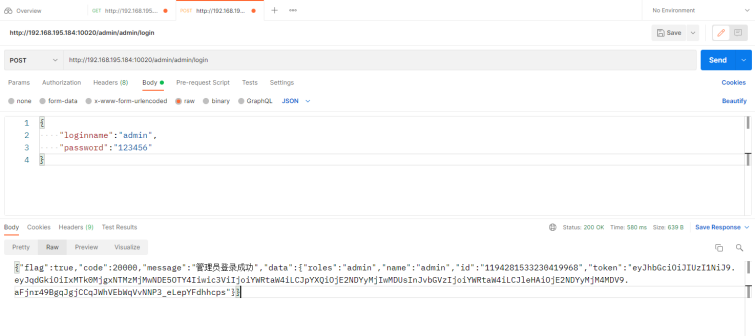

Continuous integration of microservices (7) - deploy front-end static web sites
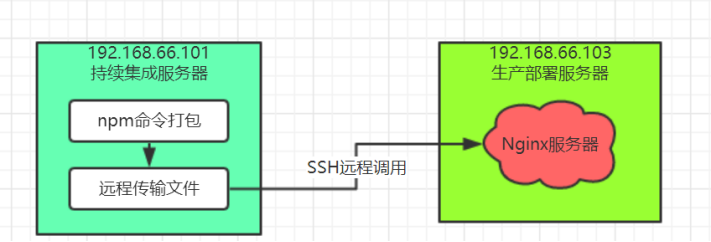
Install Nginx server
yum install epel-release
yum -y install nginx
Modify the port of nginx. The default value is 80. Change it to 9090:
vi /etc/nginx/nginx.conf
Close selinux, SELINUX=disabled
Setenforce0 is temporarily closed first
vi /etc/selinux/con "g edit the file and close it permanently
SELINUX=disabled
Start Nginx
systemctl enable nginx set startup
systemctl start nginx start
systemctl stop nginx stop
systemctl restart nginx restart
Install NodeJS plug-in
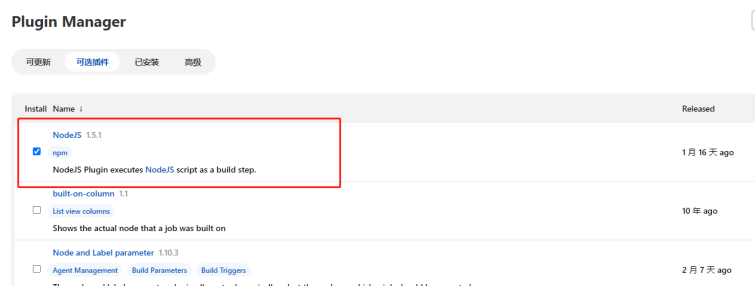
Jenkins configuring the Nginx server
Manage Jenkins->Global Tool Configuration
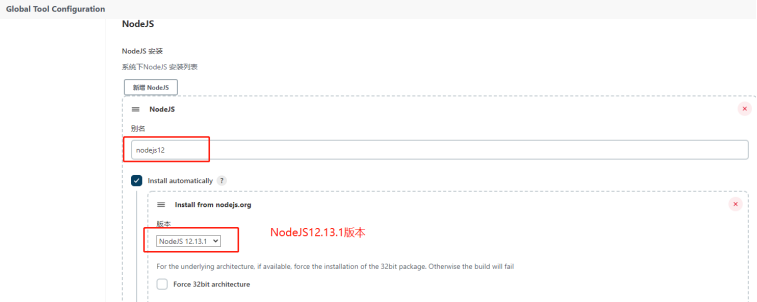
Create front-end pipeline project

//Certificate of harbor
def git_auth="1be38991-873b-4a68-8eb6-312347fdc0a4"
node {
stage('pull code') {
//Switch to variable and use double quotation marks for string symbols
checkout([$class: 'GitSCM', branches: [[name: "*/${branch}"]], extensions: [], userRemoteConfigs: [[credentialsId: "${git_auth}", url: 'git@192.168.195.180:kgc_group/tensquare_front.git']]])
}
stage('make package,deploy') {
//npm packaging using nodejs
nodejs('nodejs12'){
sh '''
npm install
npm run build
'''
}
//Remote deployment
sshPublisher(publishers: [sshPublisherDesc(configName: 'master_server', transfers: [sshTransfer(cleanRemote: false, excludes: '', execCommand: '', execTimeout: 120000, flatten: false, makeEmptyDirs: false, noDefaultExcludes: false, patternSeparator: '[, ]+', remoteDirectory: '/usr/share/nginx/html', remoteDirectorySDF: false, removePrefix: 'dist', sourceFiles: 'dist/**')], usePromotionTimestamp: false, useWorkspaceInPromotion: false, verbose: false)])
}
}





Start building
Production server validation view / usr/share/nginx/html root directory

Jenkins + docker + spring cloud deployment scheme optimization
Problems in the above deployment scheme:
1) Only one microservice deployment can be selected at a time
2) Only one producer deployment server
3) There is only one instance of each microservice, and the fault tolerance rate is low
Optimization scheme:
1) In a Jenkins project, you can select multiple microservices to publish at the same time
2) In a Jenkins project, multiple production servers can be selected and deployed at the same time
3) Each microservice is deployed in the form of cluster high availability
Jenkins+Docker+SpringCloud cluster deployment process description

Modify all micro service configurations
Registry configuration (*)
Start a docker2 server (install and deploy docker environment)
Click to view the code# Cluster version
spring:
application:
name: EUREKA-HA
---
server:
port: 10086
spring:
# Specify profile = Eureka Server1
profiles: eureka-server1
eureka:
instance:
# Specifies that when profile = Eureka Server1, the host name is Eureka Server1
hostname: 192.168.195.184
client:
service-url:
# Register yourself on eureka-server1 and eureka-server2
defaultZone: http://192.168.195.184:10086/eureka/,http://192.168.195.182:10086/eureka/
---
server:
port: 10086
spring:
profiles: eureka-server2
eureka:
instance:
hostname: 192.168.195.182
client:
service-url:
defaultZone: http://192.168.195.184:10086/eureka/,http://192.168.195.182:10086/eureka/
When starting the micro service, add the parameter: spring profiles.active to read the corresponding configuration
Other micro service configurations
In addition to Eureka registry, all Eureka services need to be added to other micro service configurations
# Eureka configuration
eureka:
client:
service-url:
defaultZone: http://192.168.195.182:10086/eureka, http://192.168.195.184:10086/eureka #Eureka access address
instance:
prefer-ip-address: true
Submit the code to Gitlab
Design the construction parameters of Jenkins cluster project
1) Installing the Extended Choice Parameter plug-in supports multiple selection boxes

2) Create pipeline project


3) Add parameter
String parameter: branch name

Multi box: item name


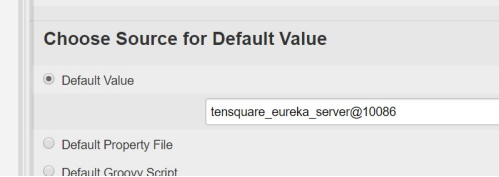

Final effect (please use English comma):

Circular packaging compilation and image making
Click to view the code//git's credentials
def git_auth="1be38991-873b-4a68-8eb6-312347fdc0a4"
//URL of git
def git_url="git@192.168.195.180:kgc_group/tensquare_back.git"
//Mirror label
def tag="latest"
//url address of harbor
def harbor_url="192.168.195.183:85"
//Image warehouse name
def harbor_name="tensquare"
//Certificate of harbor
def harbor_auth="e8b4bf42-2a87-4611-90f7-4b4a75479b5c"
node {
//Gets the name of the currently selected item
def selectedProjectNames="${project_name}".split(",")
stage('pull code') {
//Switch to variable and use double quotation marks for string symbols
checkout([$class: 'GitSCM', branches: [[name: "*/${branch}"]], extensions: [], userRemoteConfigs: [[credentialsId: "${git_auth}", url: "${git_url}"]]])
}
stage('check code') {
for(int i=0;i<selectedProjectNames.length;i++){
//Project information tensquare_eureka_server@10086
def projectInfo=selectedProjectNames[i]
//Current project name
def currentProjectName="${projectInfo}".split("@")[0]
//Current project port
def currentProjectPort="${projectInfo}".split("@")[1]
//Define the SonarQubeScanner tool
def scannerHome = tool 'sonar-scanner'
//Reference SonarQube system environment
withSonarQubeEnv('sonarqube') {
sh """
cd ${currentProjectName}
${scannerHome}/bin/sonar-scanner
"""
}
}
}
//Add public subproject
stage('make install public sub project') {
sh "mvn -f tensquare_common clean install"
}
//Package micro services, create images and upload images
stage('make package images,push images') {
for(int i=0;i<selectedProjectNames.length;i++){
//Project information tensquare_eureka_server@10086
def projectInfo=selectedProjectNames[i]
//Current project name
def currentProjectName="${projectInfo}".split("@")[0]
//Current project port
def currentProjectPort="${projectInfo}".split("@")[1]
sh "mvn -f ${currentProjectName} clean package dockerfile:build"
//Define image name
def imageName="${currentProjectName}:${tag}"
//Label images
sh "docker tag ${imageName} ${harbor_url}/${harbor_name}/${imageName}"
//Push image to harbor
withCredentials([usernamePassword(credentialsId: "${harbor_auth}", passwordVariable: 'password', usernameVariable: 'username')]) {
//Log in to harbor
sh "docker login -u ${username} -p ${password} ${harbor_url}"
//Image upload
sh "docker push ${harbor_url}/${harbor_name}/${imageName}"
sh "echo Image upload succeeded"
}
}
//Deploy application
sshPublisher(publishers: [sshPublisherDesc(configName: 'master_server', transfers: [sshTransfer(cleanRemote: false, excludes: '', execCommand: "/opt/jenkins_shell/deploy.sh ${harbor_url} ${harbor_name} ${project_name} ${tag} ${port}", execTimeout: 120000, flatten: false, makeEmptyDirs: false, noDefaultExcludes: false, patternSeparator: '[, ]+', remoteDirectory: '', remoteDirectorySDF: false, removePrefix: '', sourceFiles: '')], usePromotionTimestamp: false, useWorkspaceInPromotion: false, verbose: false)])
}
}